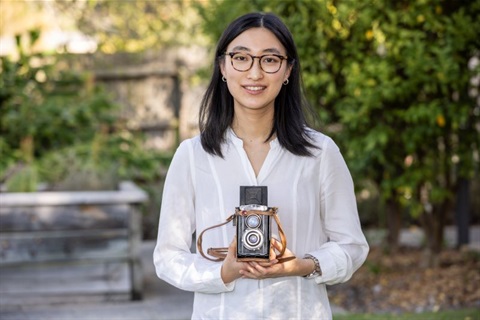Lynette Dong

Lynette Dong is a participant in Poetic Portraits, an intergenerational creative project to showcase the creative talent and diverse life experiences of different generations in Monash.
Lynette Dong started writing poetry as a way of documenting her observations and emotional responses to the patterns and people in her life.
Lynette first fell in love with poetry after studying Gwen Harwood’s poems in high school, and went on to major in English Literature at Monash University.
She feels most inspired to write after walks in nature, seeing films, art exhibits and plays, solo travelling, reading and studying the Bible.
Shelf Life
‘Store in a cool, dark place’
is the usual instruction for preserving
perishables, not cameras encased in caramel
leather. Hardened by years of unuse, skin shrivelled
now cracked, the strap twists like a dry branch.
Even if I found a use case for you, I’m afraid you’ll snap.
Hands larger than mine,
with firm grip fold open the front flap.
Flexible, in softer form now
it holds itself out.
A scene unsprings to life,
diorama-like, framed by four black walls:
His wife sits magnified, crowned
by a spray of water and a distant footbridge.
Her hands are folded over one knee,
her long braids swung easily behind her shoulders
when he first noticed her in class. She was quick
of mind and movement; he was
quick to follow her to a new city
when they graduated, camera hung around his neck.
Lens uncapped,
he finds her in view, sat on the grass in short sleeves.
She squints from sunlight, he focuses.
Shutter cocked,
he shows her how to shoot his portrait: the valley
behind him, wind waves through his hair.
For fifteen years, your life passed
on a shelf. I was hesitant to open you,
didn’t know I would find myself turning
knobs and firing shutters,
head bowed, desperate to see something
other than my bright blue bookcase.
Give me a glimpse
of what you saw: the son, the brother, the husband,
the father, my Grandpa.
Stored in a cool, dark place in my mind
is the last image I captured of him:
leaving in a taxi to the hospital.
Release.
In a garden, they ask someone to take their picture:
twin pose and black jackets – his leather, hers wool.
Between ourselves
From where I stand, you don’t look familiar.
You don’t look up. I’m a stranger to you.
You hate when strangers stare at you,
tease and smile at you, want a reaction from you:
so you cried. Allergic to attention, and to nuts, as you’ll
find, taste, spit and scrub your tongue
in vain, you don’t have the word yet to
explain discomfort.
Just between ourselves, I wonder at
how you spoke Chinese to your friends at church,
mother tongue long abandoned.
From where I stand, I miss that child.
Remember when you cried after finishing year twelve?
You love a melancholy mood. Only days before,
with school gates behind and a downhill walk to the station,
the late November light filled you
with future and trust. But like Lot’s wife, you looked back
and pitied the girlhood you lost, a city in flames.
On a sage-green carpet, your tears formed a pillar of salt.
Fresh-faced learner’s permit: yellow plates
plastered on mum’s Corolla give you licence to drive, enter
the freeway too slow and merge.
You reborrowed On the Jellicoe Road today,
because you wanted something familiar, just for comfort:
young-adult fiction always ends well.
Just between ourselves, I’d give anything
for a fraction of your bold belief – in God,
in art for art’s sake, in common morality, and yourself.
From where I stand, you look somewhat familiar.
I recognise your coat. You remind me of
our grandmother, your feet flat, spread like the
roots of a Redwood that intertwine
cords of grief, love, friendships lost and made, relief
in every answered prayer. Your hope ticks on steady
like quartz in the movement of your wristwatch.
Just between ourselves, I’m grateful you’re here.
Stubborn like a child, exactly
where I want to be, you refused
to harden when provoked
by life’s cruelty. ‘Yes,
I am coming soon’.